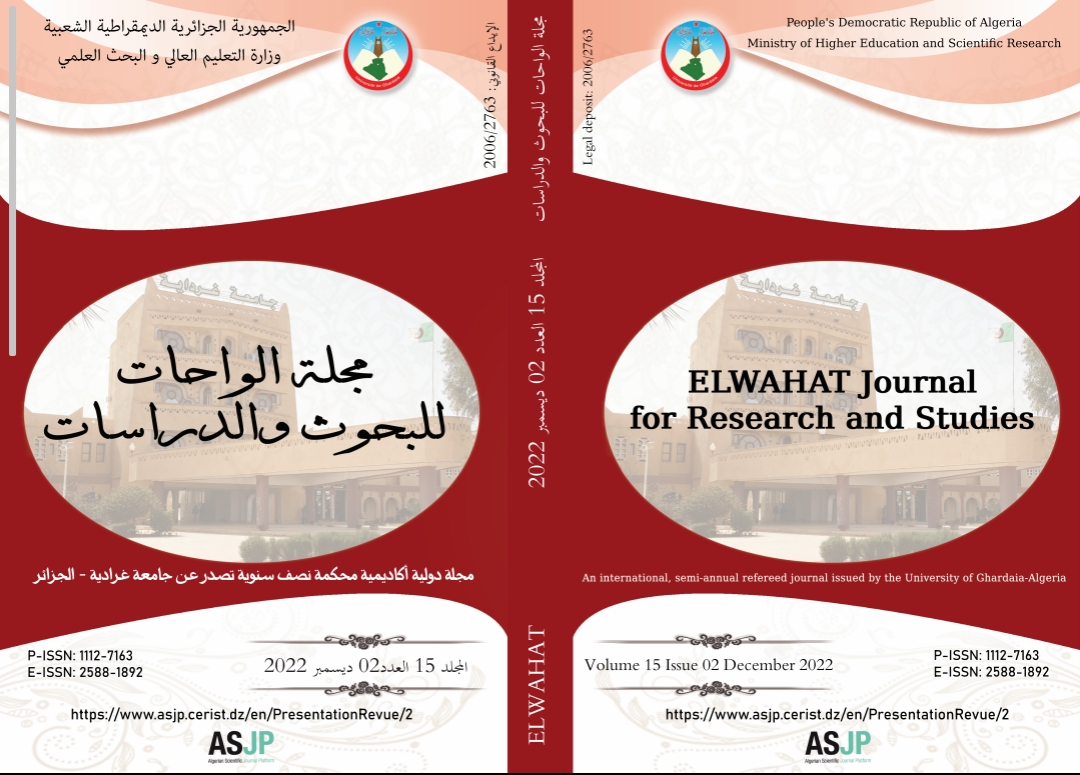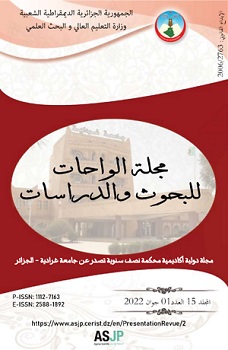Important Soft Skills to Promote Youth Employment in Algeria
الملخص
Abstract
This Paper Suggests That Algerian Youth Need To Develop A Set Of Specific Skills In Order To Gain Access To Employment, Or Create Their Own Business. The Current Research Aims At Identifying Some Important Skills That Can Help Youth Overcome The Challenges They Face In The Algerian Employment Context; It Also Presents Some Career Projects’ Initiatives In Algeria That Have Already Succeeded In Building Many Necessary Soft Skills. A Questionnaire Was Administered To 3rd Year License And Master II Language Sciences EFL Students At Badji Mokhtar Annaba University In Order To Investigate Their Self-Perceived Soft Skills Level. The Findings Revealed That EFL Students Have An Average To A Decent Level Of Soft Skills That Is Needed In The Workplace. Yet More Efforts Are Still Required To Improve Those Crucial Skills.
Keywords: Soft Skills, Youth Employment, Job Search, Skills Gap, Career Projects.
المراجع
Allen, J. & van der Velden, R. (2001). Educational Mismatches versus Skill Mismatches: Effects on Wages, Job Satisfaction, and On-the-Job Search, Oxford Economic Papers (53), pp. 434-52.
Cappelli, P. (2012). Why Good People Can’t Get Jobs: The Skills Gap and What Companies Can Do About It, Philadelphia: Wharton Digital Press.
Duckworth, A. L., Peterson, C., Matthews, M. D., & Kelly, D. R. (2007). Grit: Perseverance and passion for long-term goals. Journal of Personality and Social Psychology, 92(6), 1087–1101. https://doi.org/10.1037/0022-3514.92.6.1087
Dweck, C. S. (2006). Mindset: The new psychology of success. New York: Random House.
Gates, S., Lippman, L., Shadowen, N., Burke, H., Diener, O., and Malkin, M. (2016). Key Soft Skills for Cross-Sectoral Youth Outcomes. Washington, DC: USAID’s YouthPower: Implementation, YouthPower Action.
Honeyman, C. (2016). Soft skills development: Guiding notes for project and curriculum design and evaluation. Washington, Dc: World Learning, Inc.
Honeyman, C. (2019). Soft Skills for Youth Employment in Algeria: Qualitative Research Report. Washington, Dc: World Learning, Inc.
Kovačič, H. (2009). Collaboration between Employers and Higher Education Institutions. In Pavlin S. (ed.): Report on the Qualitative Analysis of Higher Education Institutions and Employers in Five Countries: Development of Competencies in the World of Work and Education. Hegesco Project. Ljubljana: University of Ljubljana.
Lippman, L. H., Ryberg, R., Terzian, M., Moore, K. A., Humble, J., & McIntosh, H. (2013). Positive and protective factors in adolescent well-¬being. In B. Asher, F. Casas, I. Frones, & J. E. Korbin (Eds.), The Handbook of Child Well-¬Being: Theories, Methods, and Policies in Global Perspective. New York: Springer.
Lippman, L.H, Moore, K., Guzman, L., Ryberg, R., McIntosh, H., Ramos, M., Caal, S., Carle, A., Kuhfeld, M. (2014). Flourishing Children: Defining and Testing Indicators of Positive Development. Heidelberg: Springer Science and Business Media.
Lippman, L., Ryberg, R., Carney, R., and Moore, K. (2015). Key soft skills that foster youth workforce success: toward a consensus across fields. Washington, Dc: Child Trends and USAID YouthPower.
Mind Tools Content Team, (n.d). Professionalism: Meeting the Standards That Matter. Retrieved from: https://www.mindtools.com/pages/article/professionalism.htm
OECD & EC. (2012). A Guiding Framework for Entrepreneurial Universities. Final version 18th December 2012. OECD LEED Forum and the European Commission, DG for Education and Culture Publishing. Available online at: https://www.oecd.org/site/cfecpr/EC-OECD EntrepreneurialUniversities Framework.pdf
Silatech, (n.d). Djazair Ta3mal Youth Employability Portal. Retrieved from: https://silatech.org/algeria/#1545565246890-a417f3ac-7792
Stein, S. (2000). Equipped for the future content standards: What adults need to know and be able to do in the 21st century. Washington, DC: National Institution for Literacy.
Sunday, N.H. (2013). Assessment of employability skills development opportunities for senior secondary school chemistry students. Journal of Educational Research and Reviews Vol. 1(2), pp. 16-26.
Technopolis Organization. (2011). University Business Cooperation – 15 Institutional Case Studies on the Links between Higher Education Institutions and Business. European Commission, DG for Education and Culture.
World Learning, (n.d). Bawsala Mentorship Program. Retrieved from: https://www.worldlearning.org/program/maharat-mentorship-program-in-algeria/
World Learning Algeria, (n.d).Youth Employment Project. Retrieved from: https://algeria.worldlearning.org/youth-employment-project/







